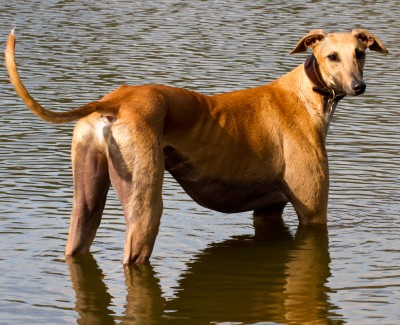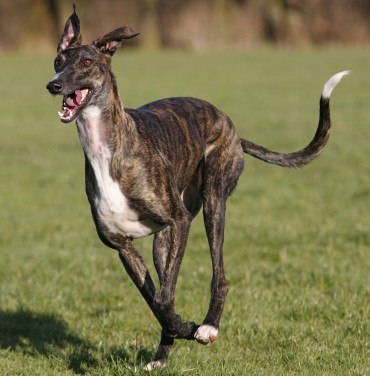Greyhound Health Care & Feeding
By Michele Welton, Dog Trainer, Breed Selection Consultant, Author of 15 Dog Books

Start your Greyhound off on the right foot by feeding the right food, giving the right vaccinations, finding the right vet, and if you're going to spay or neuter, don't do it too early.
Jump down to this list of
Greyhound Health Problems
Or check out my advice for raising a healthy Greyhound puppy or adult dog:
 Dog Health Care – The Sensible Way
Dog Health Care – The Sensible Way
Read my advice on daily health care so your Greyhound lives a long, healthy life and seldom needs to see the vet... [read more]
 3 Best Ways To Feed Your Dog Healthy Food
3 Best Ways To Feed Your Dog Healthy Food
You can dramatically increase your dog's chances of living a long, healthy life by feeding the right food. Cutting right to the chase, the best foods for your Greyhound are... [read more]
 A Quick Way To Make Homemade Dog Food
A Quick Way To Make Homemade Dog Food
Your Greyhound will love real chicken, turkey, beef, fish, eggs, yogurt, broccoli.... this is not just "people food" and I'll tell you why... [read more]
 5 Best Kibble and Canned Dog Foods
5 Best Kibble and Canned Dog Foods
Some are better than others, but I must be honest – I'm not a huge fan of dry or canned dog food. Here are my concerns... [read more]
 Vaccinations and Booster Shots: Needed or Not?
Vaccinations and Booster Shots: Needed or Not?
How many vaccinations does your Greyhound puppy really need? Does your adult dog need yearly booster shots? The vaccination guidelines have changed! Find out what some vets aren't telling you... [read more]
 Spaying Your Female Dog: Pros and Cons
Spaying Your Female Dog: Pros and Cons
Should your female Greyhound be spayed? Current research says, "The AGE at which you spay can be vitally important to your dog's future health." So what's the best age? [read more]
 Neutering Your Male Dog: Pros and Cons
Neutering Your Male Dog: Pros and Cons
Have you been told that you must neuter your male Greyhound? Current research shows that the issue is not so simple. Pet owners are not being told about some risks associated with neutering male dogs, especially neutering too early... [read more]
 Make Sure Your Vet is the Best!
Make Sure Your Vet is the Best!
Is your current veterinarian really the best choice for your dog? Here's how to tell... [read more]
 Assisi Loop Review
Assisi Loop Review
Does your Greyhound suffer from arthritis, hip dysplasia, disk disease, colitis? My honest review of a veterinary device you can use at home to reduce inflammation and pain. [read more]

Complete list of Greyhound health problems
Cancer, especially bone cancer (osteosarcoma), claims the lives of many Greyhounds.
Just as dangerous is an emergency gastrointestinal syndrome called bloat, which can kill a Greyhound within a few hours.
Most pet Greyhounds are ex-racing dogs who may suffer special health problems associated with their past racing environment:
- tick-borne diseases (Rocky Mountain spotted fever, Lyme disease)
- intestinal bacterial infections (e-coli, salmonella, and campylobacter)
- protozoal infections (giardia and coccidia)
- worms
- dental disease
- early osteoarthritis from racing injuries
- general alopecia (hair loss), caused by constant rubbing against the metal bars in their small cages
- vasculopathy, a potentially fatal disease where small blood vessels become blocked, producing swollen hind legs, skin ulcers, and sometimes kidney disease
Because Greyhounds are instinctive chasers, they're especially vulnerable to being killed by a car, as they will take off and not come back. This is not an off-leash breed.
Chronic allergies cause itchy skin in Greyhounds. Their thin-skinned, bony elbows can develop thick calluses, and their footpads are prone to forming hard "corns" (digital keratoma). Aging Greyhounds are prone to hair loss on their thighs.
Serious eye diseases in Greyhounds include pannus, cataracts, progressive retinal atrophy (as early as 12 months), and vitreous degeneration (which can lead to retinal detachment).
Several heart diseases are a concern in the breed.
In terms of orthopedic diseases, osteochondritis has been reported in Greyhounds, and hip dysplasia does occur, but the rate is low. The Orthopedic Foundation of America evaluated the hip X-rays of 350 Greyhounds and found 3% dysplastic. That's excellent for this size dog.
Yet osteoarthritis and intervertebral disk disease are quite common in Greyhounds because of excessive stress put on their joints and vertebrae from racing.
Other health issues in Greyhounds include epilepsy, blood-clotting diseases (von Willebrand's and hemophilia A), chronic kidney disease, hypothyroidism, inflammatory bowel disease, and megaesophagus.
Because of their low body fat, all sighthounds are extra sensitive to anesthetics. You should look for a vet who will carefully follow the special Greyhound Anesthesia Protocol.
All sighthounds REQUIRE open space to run. A Greyhound who can't stretch his legs and gallop off-leash, for just a few minutes each day, will not develop proper muscle tone for good health.
Musculoskeletal injuries (fractures, pulled muscles or ligaments, broken toes, paw injuries, etc.) are common when slender-legged sighthounds race about.
Greyhounds have little or no insulation and cannot tolerate cold weather. Put a sweater on them when the temperature dips below 40 degrees.
Preventing health problems
Some health problems are inherited. For example, if your dog inherits from his parents the genes for an eye disease called PRA, he will go blind and there's nothing anyone can do about it.
 But most health problems can be prevented by the ways you raise your dog.
But most health problems can be prevented by the ways you raise your dog.
FREE eBOOK! My free online health care program, 11 Things You Must Do Right To Keep Your Dog Healthy and Happy shows you how to raise your Greyhound in all the right ways that help prevent health problems. Become your dog's health care champion!
My best-selling books – now available FREE on my website
 Respect Training For Puppies: 30 seconds to a calm, polite, well-behaved puppy is for puppies 2 to 18 months old. Your puppy will learn the 21 skills that all family dogs need to know. Click here to read for free.
Respect Training For Puppies: 30 seconds to a calm, polite, well-behaved puppy is for puppies 2 to 18 months old. Your puppy will learn the 21 skills that all family dogs need to know. Click here to read for free. Teach Your Dog 100 English Words is a unique Vocabulary and Respect Training Program that will teach your adult dog to listen to you and do what you say. Click here to read for free.
Teach Your Dog 100 English Words is a unique Vocabulary and Respect Training Program that will teach your adult dog to listen to you and do what you say. Click here to read for free. 11 Things You Must Do Right To Keep Your Dog Healthy and Happy helps your dog live a longer, healthier life. Get my honest advice about all 11 Things before you bring home your new puppy, because some mistakes with early health care cannot be undone. Click here to read for free.
11 Things You Must Do Right To Keep Your Dog Healthy and Happy helps your dog live a longer, healthier life. Get my honest advice about all 11 Things before you bring home your new puppy, because some mistakes with early health care cannot be undone. Click here to read for free.

